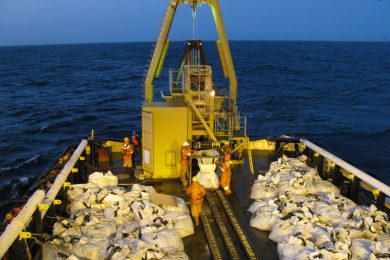
Fishing Industry response to ‘nod for Marine Phosphate Mining’

The Confederation of Namibian Fishing Associations (CNFA) has serious questions about the integrity of somebody who calls himself an environmentalist while deciding it is safe to mine for phosphate, after looking at a scoping report, as Dr Chris Brown is quoted as stating in a local newspaper recently.
For public information, a scoping report is done to determine what needs to go into an Environmental Impact Assessment (EIA) study. Besides, an EIA was not yet done for the land-based part of the proposed project, which is a legal requirement.
For how long has Dr Chris Brown been an environmentalist? Or when did he stop being one and not informed the world?
Where is the transparency that should guide the process, if an environmentalist that has been openly supporting and promoting phosphate mining, also represents the Chamber for the Environment in approving it!
What ‘independent studies as late as 2020’ is he referring to – perhaps the studies that we and others have been demanding to see, but were being told to wait! If Chris Brown was given access to these studies, in preference to the general public, this shows that he is no longer an independent party. And neither is the Marine Spatial Planning (MSP), which was supposed to bring relevant parties together to plan using the ocean’s resources sustainably and transparently.
Chris Brown and the Chamber for the Environment are clearly out of touch with what is happening in the rest of the world, where both New Zealand and Mexico have both studied and rejected the prospect. Others, such as Mauritania and Guinea, are paying a high price for having ‘given it the nod’.
The dredging site proposed for phosphate is inside and close by to nursery areas of commercial fish species, which are protected areas and important to the health of biomass.
The jobs promised by phosphate are also nowhere near the close 60,000 direct, indirect and related jobs already existing because of the fishing industry. From NMP documents, it would only need 139 people to dredge 3M tonnes of sediment.
Brown’s understanding of diamond mining about phosphate dredging is also insufficient. In diamond mining, gravel is brought aboard the vessel, sifted and all material immediately returned to the sea. Phosphate mining removes sediments from a depth of 4- 6 meters, which includes heavy metals that had formed over millions of years, and that would now continue to leach into the ocean – and all sea life. This seawater, with up to 5 000 000 tons of phosphate and radio-active bearing material dredged to an on-shore processing plant (for which no EIA has been done) and then returned to the ocean again – all of these do not bother the environmentalist?
Yes, this is ‘all claws out’ time. Namibians are fighting for our survival, and phosphate mining has no place here. The Confederation of Namibian Fishing Associations (CNFA) joins the Social Justice Group and hundreds of thousands of Namibians in demanding a permanent cancellation of the unwise and non-sensical pursuit of marine phosphate mining.













































